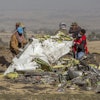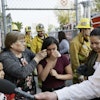NEW ORLEANS (AP) — Now that a $4 billion plea deal has resolved BP's criminal liability for the massive Gulf of Mexico oil spill nearly three years ago, the company will turn its focus to a trial that could potentially cost it billions of dollars more in civil penalties.
At the conclusion of a hearing Tuesday that included emotional testimony and a BP executive's apology, a federal judge agreed to let the London-based oil giant plead guilty to manslaughter charges for the April 2010 deaths of 11 workers on the Deepwater Horizon rig and pay the record amount of criminal penalties.
What the plea deal approved by U.S. District Judge Sarah Vance doesn't resolve, though, is the federal government's civil claims against BP.
A trial scheduled to start Feb. 25 is designed to identify the causes of BP's well blowout, which triggered the deadly rig explosion and massive oil spill in the Gulf of Mexico on April 20, 2010. The first phase of the trial also is designed to assign percentages of blame to BP and its partners in the ill-fated drilling project.
BP and the Justice Department have engaged in settlement talks that could resolve the civil claims against BP by the federal government and Gulf states before trial.
David Uhlmann, a University of Michigan law professor and former chief of the Justice Department's environmental crimes section, said it's reasonable to expect a civil settlement with the Justice Department to cost BP more than twice as much as the criminal settlement.
"There is tremendous incentive for both sides to settle," Uhlmann said, noting that BP would face much larger civil penalties if the government can convince the trial judge that the company acted with gross negligence before the deadly blowout.
Vance noted that the company already has racked up more than $24 billion in spill-related expenses and has estimated it will pay a total of $42 billion to fully resolve its liability for the disaster in the Gulf of Mexico.
BP agreed in November to plead guilty to charges involving the workers' deaths and for lying to Congress about the size of the spill from its broken well, which spewed more than 200 million gallons of oil. Much of it ended up in the Gulf and soiled the shorelines of several states. The company could have withdrawn from the agreement if Vance had rejected it.
The judge said the $4 billion criminal settlement is "just punishment" for BP, even though the company could have paid far more without going broke. In accepting the deal, Vance also cited the risk that a trial could result in a much lower fine for BP, one potentially capped by law at $8.2 million.
The criminal settlement calls for BP to pay nearly $1.3 billion in fines. The largest previous corporate criminal penalty assessed by the Justice Department was a $1.2 billion fine against drug maker Pfizer in 2009.
The plea deal also includes payments of nearly $2.4 billion to the National Fish and Wildlife Foundation and $350 million to the National Academy of Sciences. The two groups will administer the money to fund Gulf restoration and oil spill prevention projects.
The $4 billion in total penalties are 160 times greater than the $25 million fine that Exxon paid for the 1989 Valdez spill in Alaska, Vance noted.
Before she ruled, the judge heard an apology from a BP executive and emotional testimony from relatives of the 11 workers who died when BP's blown-out Macondo well triggered an explosion on the rig and started the spill.
"I've heard and I truly understand your feelings and the losses you suffered," Vance told the family members.
Keith Jones, whose 28-year-old son, Gordon, died in the rig explosion, said $4 billion isn't adequate punishment.
"It is petty cash to BP," he told Vance. "Their stock went up after this plea deal was announced."
Billy Anderson, whose 35-year-old son, Jason, died in the blast, recalled the trauma of watching the disaster play out on television.
"These men suffered a horrendous death," he said. "They were basically cremated alive."
BP America vice president Luke Keller apologized to the relatives of the workers who died and for the spill's environmental damage to the Gulf Coast.
"BP knows there is nothing we can say to diminish their loss," he said. "The lives lost and those forever changed will stay with us. We are truly sorry."
A series of government investigations have blamed the blowout on time-saving, cost-cutting decisions by BP and its partners on the drilling project.
Most of the families of rig workers who were killed or injured in the explosion already have settled their claims against BP, through a process separate from this plea deal.
BP also has separately agreed to a settlement with lawyers for Gulf Coast residents and businesses who claim the spill cost them money. BP estimates the deal with private attorneys will cost the company roughly $7.8 billion.
The Justice Department also has reached a settlement with rig owner Transocean Ltd. that resolves the government's civil and criminal claims over the Swiss-based company's role in the disaster.
Transocean agreed to plead guilty to a misdemeanor charge of violating the Clean Water Act and pay $1.4 billion in civil and criminal penalties. U.S. District Judge Jane Triche Milazzo has scheduled a Feb. 14 hearing to decide whether to accept that criminal settlement. A different judge will decide whether to accept Transocean's civil settlement.
In other criminal cases, four current or former BP employees have been indicted. BP rig supervisors Robert Kaluza and Donald Vidrine are charged with manslaughter, accused of repeatedly disregarding abnormal high-pressure readings that should have been glaring indications of trouble just before the blowout.
David Rainey, BP's former vice president of exploration for the Gulf of Mexico, was charged with withholding information from Congress about the amount of oil that was gushing from the well.
Former BP engineer Kurt Mix was charged with deleting text messages about the company's spill response.






















